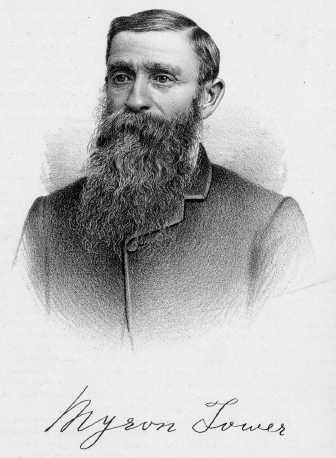wherein to work out the problem of
"How to make a success of life," starting out from his
old home in 1856, and spending his first winter away
from the parental roof in Walworth County, Wis. In the
spring of 1857 he started for Minnesota, going by rail
as far as the railway was completed, thence by stage
to Prairie du Chien, and from there on the river to La
Crosse, where he engaged with a commission merchant to
travel through Northern Minnesota and Wisconsin. In
the fall he returned to Walworth County, whence he
again went to Minnesota in the following spring of
1858, and located, being in the employ of a surveying
party, and in the winter he taught singing school in
different places in Olmsted and Fillmore Counties. In
the summer of 1859 he went to La Crosse Valley, Wis.,
and rented a farm. The next winter he made his home in
Walworth County, and then went to Illinois, where he
bought a threshing-machine in the fall of 1860, and
ran it very profitably that season. We next hear of
him as again living on a rented farm in La Crosse
Valley, where he staid a year. After that he returned
once more to Minnesota, and settled in the town of
Saratoga, Winona County.
The life of our subject has an added
interest for us in that he was a member of that great
and glorious body of soldiery who preserved our Union
intact, and the honor of our flag unsullied, during
the late civil strife, and at the risk of losing their
lives, and at the sacrifice of all that they held dear
on earth. It was while a resident of Minnesota, in the
winter of 1862-63, that Mr. Tower enlisted in Company
K, 9th Minnesota Infantry, and served until after the
close of the war. He had a thrilling experience in the
army, suffering all the terrible hardships that can
befall a soldier, and if he had not inherited a fine
physique, and a constitution of iron from a temperate
and hardy ancestry, he would scarcely have been alive
to-day. He was wounded June 10, 1864, in the battle of
Guntown, and lay on the battle-field six days with no
medical attendance and nothing to eat or drink. He
took his gun to pieces and buried it to save capture.
Six days after the battle he was taken by the rebels
to Andersonville Prison, suffering severely from a
wound in his left leg. In the September following his
capture he and other of his fellow prisoners dug a
tunnel, through which he and four of his comrades
escaped outside of the stockade, but they were
recaptured when five miles away, and were obliged to
return to the horrors of prison life. In October our
subject made his escape again, by riding out under the
provision wagon, making his way to the woods, where he
traveled nights, and remained concealed during the
day. He was obliged to forage for a living, and the
first few days ate nothing but raw sweet potatoes and
wild grapes, but he finally ventured to the negro
cabins, whose hospitable inmates gave him hoe cake to
stay his hunger. He was still suffering severely from
the effect of his wounds, from which he has never
recovered, his progress was therefore necessarily very
slow, and notwithstanding the brave effort that he had
made to regain his liberty, he was recaptured near
Cape Fear River, and taken to Wilmington, N. C., and
thence to Florence, S. C., where he was confined until
December, 1864. He was then exchanged and taken to the
hospital in Annapolis, where he nearly died from
sickness caused by his wounds, and at the time of his
discharge from the hospital, June 20, 1865, and for
two years after, he walked with two crutches, and
occasionally has to resort to them even now.
After his discharge from the army
Mr. Tower returned to Minnesota, and resided there
until 1868, when he removed to Nebraska, the journey
from Minnesota being made with a team in about sixteen
days. He made a claim to Government land in Mill
Precinct, and getting some lumber at Plattsmouth,
about forty-five miles distant, erected the first
frame house in the vicinity. Plattsmouth was the
nearest market and depot for supplies. The country
roundabout was in a very wild and unsettled condition,
antelope and elk being plenty, and a few miles west
buffaloes were numerous. Our subject improved quite a
tract of land, planted fruit and shade trees, and
resided there until the fall of 1870. He then sold
that place, and bought land near there, which is now
included in the city, and engaged in the nursery
business, being a pioneer in that line. The first year
he cleared $1,000 on his nursery stock and small
fruits, and he continued to do well until 1874, when
the grasshoppers destroyed his crops, and he lost
about $6,000 thereby, and
|


